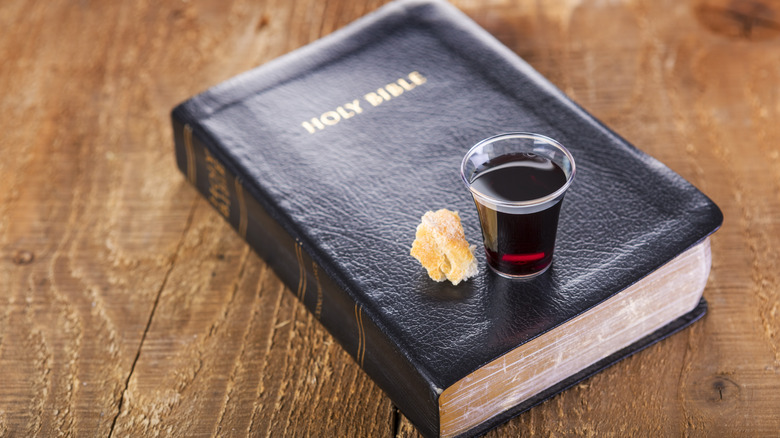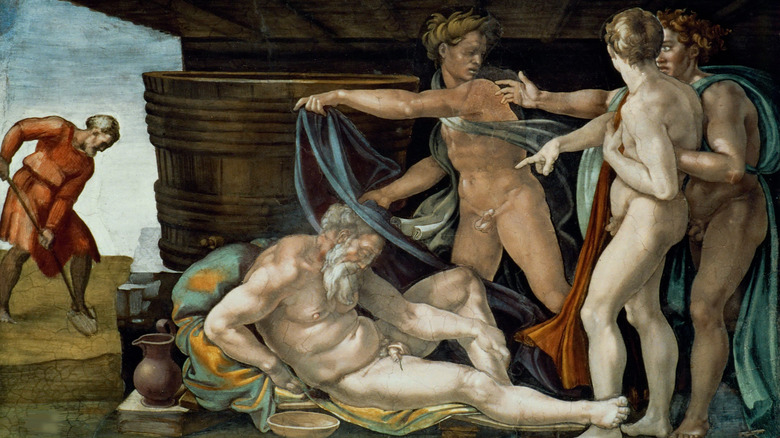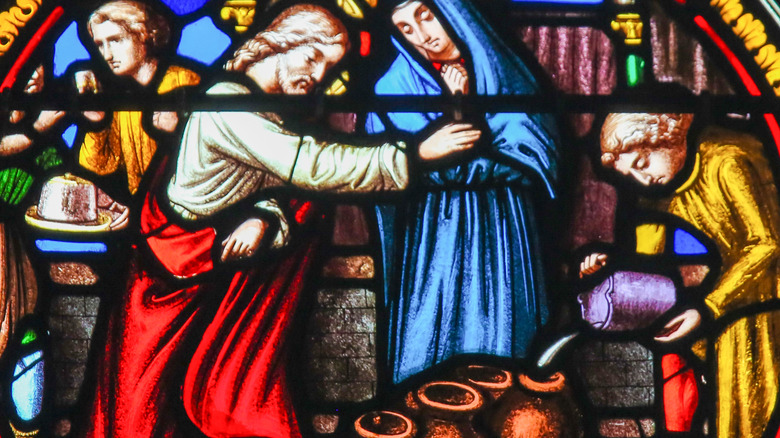The Bible's Stance On Drinking Alcohol Might Surprise You
It's hard to get a good take on how Christians feel about the subject of drinking alcohol overall. While they tend to be pretty unanimous on the subject of the 10 Commandments (they are for them) and generally hold the party line on matters of basic morality, their stance on booze seems to vary widely from denomination to denomination. Southern Baptists (via Gallup) are for the most part ardent anti-drinkers and The Layman says that even Methodists and Presbyterians stick to using non-fermented grape juice when celebrating holy communion. Lutherans, Anglicans, and Catholics, on the other hand, all embrace the fruit of the vine, at least for sacramental purposes.
If none of these different religions can seem to agree on whether booze is a blessing or a curse, what does the Bible have to say on the subject? Well, it's complicated. As the History Channel points out, it is likely that numerous authors contributed to both the Old and New Testaments over several centuries so, canonical though it may be, a slight amount of inconsistency is to be expected.
The Bible has a lot to say about the evils of drunkenness
There are numerous instances in the Bible where this sacred text seems to come out strongly on the side of teetotaling. In Proverbs 31:4–5, it is stated: "It is not for kings to drink wine, or for rulers to take strong drink, lest they drink and forget what has been decreed and pervert the rights of all the afflicted." Well, that must make us pretty lucky here in the U.S. since both of our last two presidents have been non-drinkers. But what of we non-rulers? Is it ok for us to take a little nip now and then? Evidently not before attending church services, as Leviticus 10:9 warns: "Drink no wine or strong drink, you or your sons with you, when you go into the tent of meeting, lest you die."
Even when you're not worshiping, or ruling, for that matter, the Bible still warns against the dangers of intemperance. The often-quoted Proverbs 20:1 states: "Wine is a mocker, strong drink a brawler, and whoever is led astray by it is not wise," while Isaiah 5:11 warns: "Woe to those who rise early in the morning, that they may run after strong drink, who tarry late into the evening as wine inflames them!" It does seem clear that even if the Bible isn't outright forbidding the consumption of alcohol, except under certain circumstances, it advises against immoderation (and may not be too big on day drinking).
But even Jesus was known to raise a glass now and then
The most famous instance of the Bible appearing to condone drinking comes in the story of the Wedding at Cana, narrated in John 2:3-11. At this wedding, the wine famously ran out, and Jesus, at the urging of his mother Mary, was able to create more wine using water alone (to the immense relief of the wedding party, as this all took place some 2,000+ years before Drizly began delivering). Jesus also called out those who looked down on him for his imbibing ways in Matthew 11:18-19 with these words: "The Son of Man came eating and drinking, and they say, 'Look at him! A glutton and a drunkard, a friend of tax collectors and sinners!' Yet wisdom is justified by her deeds."
The Old Testament, too, seems to extol the virtues of the grape in fermented form, with the Song of Solomon enumerating the parts of the beloved, including a "mouth like the best wine" and Psalm 104:15 praising God for allowing his children to "bring forth food from the earth and wine to gladden the heart of man." The Apostle Paul even advised Timothy (said to have authored the book of the same name) that he was to "use a little wine for the sake of your stomach" (Timothy 5:23) instead of sticking to water alone, something that was probably advisable in the pre-filtration era.
What, if any, conclusions can be drawn regarding the Bible's stance on booze?
It may be tempting to go with the "multiple authors, multiple opinions" stance on why the Bible doesn't seem to stick to one clear-cut position on the topic of alcohol. Theologians, however, prefer to dig a little deeper into the matter to interpret the scripture as the word of God it is meant to be, despite its having been transcribed by mere mortals. Core Christianity, having given the manner much thought, has determined that even though the Bible authors clearly don't dismiss alcoholic beverages out of hand, at no point do they condone whooping it up without regard to the consequences. The biblical POV, they feel, is that wine, beer, and spirits are among God's many gifts to man, but we are obligated to exercise some restraint if we choose to accept these particular offerings.
If you prefer to abstain from alcohol for religious (or any) reasons, that is an admirable choice, and there is no indication in the Bible or anywhere else that God would have a problem with such abstinence. If you do choose to indulge, however, then it's clear the Lord would have you do so in a wise and responsible manner, as your local law enforcement authorities would surely agree.



